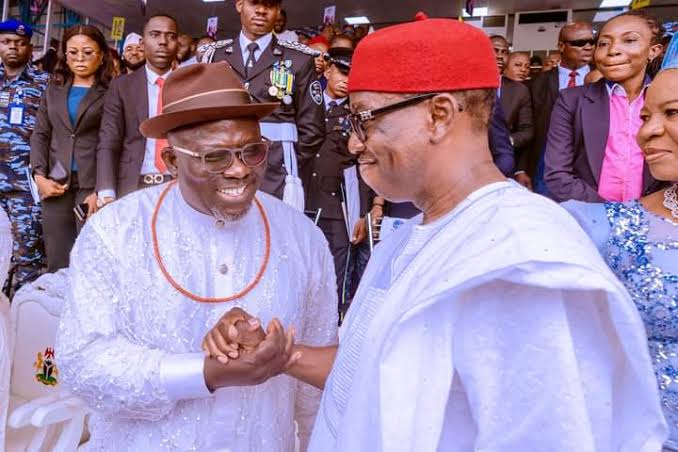The political earthquake that rattled Delta State on Wednesday, April 23, 2025, marked by the mass defection of Governor Sheriff Oborevwori, his predecessor Dr. Ifeanyi Okowa, and virtually the entire state leadership of the Peoples Democratic Party (PDP) to the All Progressives Congress (APC), is more than a regional political drama. It is an indictment on the PDP, a loud and clear signal that the once-dominant party is on a steep and possibly irreversible decline as 2027 approaches. The question now confronting political watchers, party loyalists, and the electorate alike is simple yet profound: whither PDP?
For a party that held sway at the federal level for sixteen uninterrupted years and controlled the political machinery of several states, the current trajectory of the PDP is both tragic and telling. Delta State, long regarded as one of PDP’s strongest bastions in the South-South region, has always played a pivotal role in the party’s national relevance. The defection of not just one, but two governors, one incumbent and one immediate past, is a symbolic and structural body blow to the PDP. When top political gladiators, from the governor to local government chairmen, unanimously agree to abandon ship, it means the vessel is sinking, and fast.
Senator James Manager, a veteran of PDP politics himself, laid it bare when he described the party as a “sinking boat.” That description is not just a rhetorical flourish, it is a reflection of internal decay, waning public trust, and poor strategic recalibration. Manager’s comments carry the weight of a man who has seen it all in the party and has chosen to jump ship rather than go down with it.
The post-2015 era has been a tumultuous one for the PDP. The loss of the presidency to the APC in that year marked the beginning of a cascading crisis of identity, leadership, and coherence. Instead of embarking on the kind of introspection and ideological renewal that could restore faith among its members and the public, the party has often acted like a headless chicken, flapping, running, but going nowhere.
The internal wrangling that bedeviled the 2023 elections further fractured the party. Disagreements over zoning, the G-5 governors’ rebellion, and the Atiku-Wike feud were all clear signs of a party that lacked internal cohesion. The inability to resolve these differences, or to discipline errant members in a meaningful way, only exacerbated the public perception of a party in disarray.
Delta’s defection episode is just the latest in a long line of symptoms pointing to a deeper malaise. The reasons advanced by the defectors, strategic political alignment, developmental imperatives, and the need to ensure security and stability, might appear noble on the surface, but they also underscore the PDP’s failure to inspire confidence. When a political party can no longer serve as a reliable platform for developmental continuity, when its brand becomes so diluted that even its topmost members abandon it, then that party is clearly facing an existential crisis.
Mr. Charles Aniagwu’s metaphor of palm wine that has lost its taste is apt. The PDP that once thrilled Nigerians with its intoxicating aroma of democratic ideals and national inclusiveness has turned flat. Its taste, in the political mouth of even its most loyal drinkers, has soured. And instead of refining the wine, the bartenders chose to join the party next door.
Firstly, the APC is now in a pole position in Delta State and perhaps across the South-South. With the absorption of PDP’s political structure, the APC has gained a massive organizational and grassroots boost. This could significantly affect the balance of power not only in the region but nationally, especially if similar defections ripple across other states.
Secondly, the PDP must now confront its identity crisis with utmost urgency. The party cannot continue to operate with the same arrogance and complacency that defined its pre-2015 character. It needs a complete overhaul, a rebirth led by visionary, unifying, and charismatic leadership. The 2023 elections exposed the weakness of its central leadership and its inability to manage internal contradictions. If this continues into 2027, the PDP might become a political relic, a once-great party remembered only in nostalgia.
Thirdly, the opposition space is now dangerously thin. Nigerian democracy, fragile as it is, requires a vibrant opposition to function effectively. With the PDP unraveling and smaller parties still grappling with structural inadequacies, the risk of a one-party state looms. This is bad for checks and balances, bad for policy scrutiny, and worse for the common man.
PDP must first recognize that this is a crisis of credibility. Its leadership must embark on a nationwide tour, not for campaigns, but for healing. Party structures must be audited and reformed. Youths must be given real roles, not just photo-ops and token gestures. Women must be meaningfully represented, not just on paper but in actual leadership positions.
The party must also resolve to stand for something. For too long, PDP has attempted to be everything to everyone, resulting in a diluted ideological stance. Is it center-left, conservative, progressive, or simply opportunistic? Nigerians need to know what the PDP stands for beyond the hunger for power.
Lastly, the PDP needs a new face, one not tainted by the failures of the past. Whether that face is a young technocrat, a tested administrator, or a principled statesman, the party must find and project someone that can galvanize a weary electorate. It must go beyond Atiku, beyond Wike, beyond the old guard.
As 2027 beckons, the PDP stands at a crossroads. It can either reinvent itself or fade into political oblivion. The defection of Delta’s top brass is a wake-up call. Whether the party wakes up or sleeps through the alarm will determine its fate in the coming political season.
The clock is ticking. PDP must decide: will it rise from its ruins or continue its freefall into irrelevance? Only time will tell, but time is not on its side.


